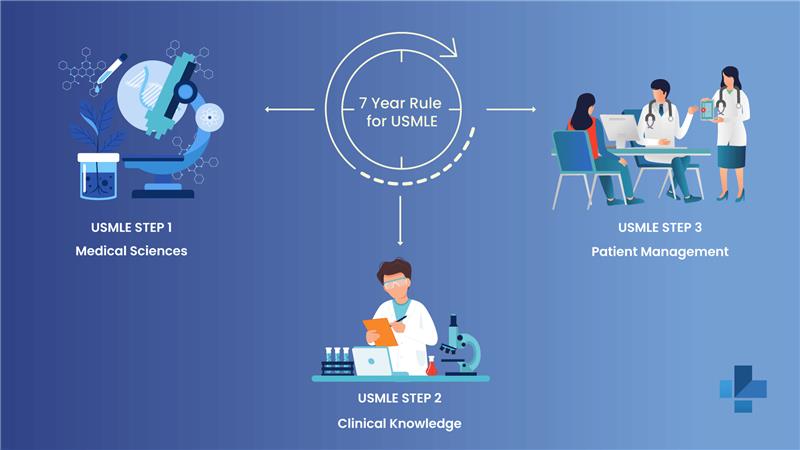
Medical graduates who are willing to work in the United States need to know about the United States Medical Licensing Examination (USMLE) 7 Year Rule. It specifies a time frame during which all USMLE steps must be completed to remain licensed. Failure to comply may delay or cancel your license application.
Whether you are an international medical graduate or a U.S. medical school student
What is the 7 Year Rule?
The seven-year rule, established by the Educational Commission for Foreign Medical Graduates (ECFMG), requires applicants to complete USMLE Step 1 and Step 2 Clinical Knowledge (CK) exams, along with other clinical criteria, within 7 years of completing their first exam.
This implies that after passing step 1, you have 7 years to complete step 2 of the CK and meet all ECFMG certification requirements. If you fail to do it, your previous scores will expire, and you will have to report on the expired exams. This rule makes sure that all licensed physicians process current and up-to-date medical knowledge before the application of medical licensure in the U.S.
State Licensing and the 7 Year Rule
The ECFMG 7 Year Rule applies to certification, in which each state medical board sets its own regulations on exam completion timelines for licensing. Most states need all 3 USMLE Steps (Step 1, Step 2 CK, and Step 3) to be completed in 7 years. Some states extend this limit to 10 years, which allows more flexibility, specifically for those who pursue postgraduate training or research. A few states have no limit on time, though this is rare.
Step 3 is taken after the residency begins and must be completed within the same timeframe, unless the state provides an exception. It is essential to verify the specific licensing timeline for the state where you plan to practice, as rules can vary widely.
Exceptions and Waivers
There are specific exceptions for the 7 Year Rule. The most common applies to MD/PhD dual-degree candidates. They may receive waivers or extensions recognizing the additional time required to complete both programs.
Other state medical boards may grant exceptions on a case-by-case basis and need strong justification, such as military service, health issues, or unique educational circumstances.
Always visit the website of the state medical board or contact them directly before assuming the eligibility for an extension or waiver.
Consequences of Missing the 7 Year Deadline
Any failure to complete all required steps in the 7-year window may have severe USMLE 7 Year Rule implications, like expired scores are no longer valid for ECFMG certification or state licensure, you have to reapply for the exam and retake the expired exams, or restate fees, paying more exam fees, preparing again, and potentially delaying your career.
If your exam scores have expired, plan your retake strategy. Consider updating the study material and seeking mentorship or structured review courses to improve performance.
Tips to Navigate the 7 Year Rule Successfully
Here are some tips to stay compliant and reduce stress:
Plan your USMLE timeline strategically: Map out all the exam dates before the initiation of Step 1 to make sure you can complete it in 7 years.
Track your deadlines: Keep a digital calendar reminder for exam completions and ECFMG certification milestones.
Leverage expert resources: Take help from credible organizations like medtigo Medical Licensing Service to manage your medical licensing journey.
Stay informed about state-specific rules: Visit the state board website regularly to verify the latest regulations and requirements.
Conclusion
The USMLE 7 Year Rule plays an important role to maintain quality and up to date of medical knowledge in physicians who seek U.S. licensure. It is necessary to understand and manage this timeline for a smooth path for examination to practice.
Stay proactive, informed, and organized throughout your USMLE journey. If you need any assistance with your licensing process, visit medtigo Medical Licensing Service or learn more about medtigo Connect.
For personalized queries or consultation, reach out to support@medtigo.com.
FAQs
- When does the 7-year countdown begin with USMLE?
The countdown begins on the date you passed your first USMLE Step exam (Step 1). You have 7 years to pass all other required Steps.
- Does the 7 Year Rule apply to all U.S. states?
Not all states enforce the 7-year rule, but some allow 10 years, and a few have no limit. Always verify with your target state’s medical board.
- Can I retake a USMLE exam if it expires under the 7-year rule?
Yes, you can retake any expired exam, but your previous passing score will no longer be valid.
- Are there any exemptions for the 7-year rule?
Yes, the most common exemption is for MD/PhD candidates who can request an extended timeline.
- How can I keep track of my USMLE exam deadlines effectively?
Use digital tools or apps to track your exam dates, certification progress, and expiration reminders. Setting early milestones helps prevent last-minute issues.






